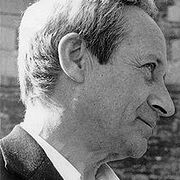Leon Poliakov (1910–1997)
Auteur de Histoire de l'antisémitisme. Tome 1 : L'âge de la foi
A propos de l'auteur
Leon Poliakov (1910-97) wrote extensively on the Holocaust and anti-Semitism. He helped establish the Centre de Documentation Juive in 1943
Séries
Œuvres de Leon Poliakov
Geschichte des Antisemitismus II. Das Zeitalter der Verteufelung und des Ghettos (1978) 5 exemplaires
Geschichte des Antisemitismus. Band 5. Die Aufklärung und ihre judenfeindliche Tendenz. (1983) 5 exemplaires
Geschichte des Antisemitismus 4 : Die Marranen im Schatten der Inquisition. Mit einem Anhang: Die Morisken und ihre… (1981) 4 exemplaires
Geschichte des Antisemtismus III. Religiöse und soziale Toleranz unter dem Islam (1979) 4 exemplaires
Geschichte des Antisemitismus, Band 7: Zwischen Assimilation und "Jüdischer Weltverschwörung"; (1988) 3 exemplaires
Moscou, troisième Rome : Les intermittences de la mémoire historique (La Force des idées) (1989) 2 exemplaires
History of Anti-Semitism (Vol. 1-3) From the Time of Christ to the Court Jews Volume 1; From Mohammed to Marranos… 1 exemplaire
Gli Ebrei sotto l'occupazione italiana 1 exemplaire
1989 1 exemplaire
St. Petersburg - Berlin - Paris: Memoiren eines Davongekommenen (Critica Diabolis) (2019) 1 exemplaire
The Historey of Anti-Semitism vol II 1 exemplaire
La Condition des Juifs en France 1 exemplaire
L'Etoile Jaune 1 exemplaire
Hommes et bêtes, entretiens sur le racisme, actes du colloque tenu du 12 au 15 mai 1973 au centre culturel… 1 exemplaire
La emancipación y la reacción racista 1 exemplaire
Historia del antisemitismo: de Mahoma a los marranos 1 exemplaire
Historia del antisemitismo de Mahoma a los marranos 1 exemplaire
Dossier Eichmann 1 exemplaire
Du Christ aux Juifs de cour... 1 exemplaire
Les Samaritains suivi d'une étude de Gilles Firmin "A propos du Pentateuque samaritain" (1991) 1 exemplaire
MITI ARIAN 1 exemplaire
MAX WEBER ET LES THÉORIES BIORACIALES DU XX e SIÈCLE 1 exemplaire
Historia do anti-semitismo 1 exemplaire
Harvest of Hate (Pg. 224-end) 1 exemplaire
Harvest of Hate (Pg. 186-223) 1 exemplaire
Harvest of Hate (Pg. 1-185) 1 exemplaire
Oeuvres associées
Étiqueté
Partage des connaissances
- Nom canonique
- Poliakov, Léon
- Nom légal
- Poliakov, Léon
- Date de naissance
- 1910-11-25
- Date de décès
- 1997-12-08
- Sexe
- male
- Nationalité
- France
- Lieu de naissance
- St. Petersbourg, Russie
- Lieu du décès
- Paris, Île-de-France, France
- Lieux de résidence
- Paris, France
- Études
- Faculte de Droit
- Professions
- Professeur (Histoire)
Historien (Histoire contemporaine, WW2, Holocauste) - Relations
- Wulf, Joseph (co-author)
- Organisations
- Centre national de la recherche scientifique
Ecole Pratique des Hautes Etudes - Courte biographie
- Léon Poliakov was born to a Jewish family in Saint Petersburg, Russia. His father Wladimir Poliakov owned a publishing house and named his son in homage to Leo Tolstoy. Following the Bolshevik Revolution, the family fled to France, settling in Paris.
There his father founded a new publishing house and in 1933 created the daily newspaper Pariser Tageblatt, targeted to exiled German readers. As a teenager, Léon lived for a few years in Italy and Germany, where he witnessed the rise of Nazism. He then returned to Paris, studied law and literature at university, and wrote for the paper until 1939. At the start of World War II, he enlisted with the French army. Taken prisoner with his battalion by the Germans, he escaped and joined the resistance. In 1943, he helped establish the Centre de Documentation Juive Contemporaine or CDJC (Center for Contemporary Jewish Documentation), dedicated to collecting documentary evidence of the Holocaust. He assisted Edgar Faure at the Nuremberg Trial and brought back from Nuremberg, with his colleague Joseph Billig, numerous documents that became part of the CDJC collection. Under the aegis of the CDJC, Poliakov published his first books, La Condition des Juifs sous l'occupation italienne (The Condition of the Jews under the Italian Occupation, 1946) and L’Étoile jaune (The Yellow Star, 1949). In 1947, he married his wife, Germaine, with whom he had a son. Poliakov served as director of research at the Centre national de la recherche scientifique or CNRS (French National Center for Scientific Research) from 1954 to 1971 and was on the faculty of the Ecole Pratique des Hautes Etudes. He was the first scholar to question the attitude of Pope Pius XII and the Vatican on the Holocaust; in 1950, he published "The Vatican and the 'Jewish Question' -- The Record of the Hitler Period -- and After" in the Commentary. Poliakov's groundbreaking 1951 book Breviaire de la haine (Harvest of Hate) was the first major work on the Nazi genocide. He co-authored a trilogy of major books with German-born historian Joseph Wulf: Das Dritte Reich und die Juden (The Third Reich and the Jews, 1955),
Das Dritte Reich und seine Diener (The Third Reich and its Servants, 1956), and Das Dritte Reich und seine Denker (The Third Reich and its Thinkers, 1959). In 1971, he published Le Mythe aryen (The Aryan Myth: A History of Racist and Nationalist Ideas in Europe). Poliakov was also a pioneer in the fight against revisionists and Holocaust deniers. He published his memoirs L'auberge des musiciens in 1981.
Membres
Critiques
Prix et récompenses
Vous aimerez peut-être aussi
Auteurs associés
Statistiques
- Œuvres
- 60
- Aussi par
- 1
- Membres
- 656
- Popularité
- #38,461
- Évaluation
- 4.1
- Critiques
- 11
- ISBN
- 120
- Langues
- 7














In: Archives de sciences sociales des religions, n°59/2, 1985. p. 292. … ; (en ligne),
URL : https://www.persee.fr/doc/assr_0335-5985_1985_num_59_2_2358_t1_0292_0000_3… (plus d'informations)